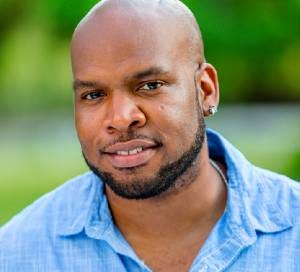Pursuing Wholeness as Spiritual Practice: Trey Ferguson Interview (Safe Spiritual Spaces Interview Series)
A new interview series about what makes a safe/healthy spiritual space
Hello, dear readers! A bonus post for this week! I’m so excited for our first guest in a brand-new series where we have conversations about what makes a safe/healthy spiritual space.
Welcome to the Safe Spiritual Spaces Interview Series, where we hear from writers, artists, therapists, clergy, practitioners, and other voices who do work at the intersections of spirituality, creativity, and justice. For each post in this series, I’ll ask our guests the same four questions, and they will share from their wisdom, experience, and research.
Today, we welcome Pastor Trey Ferguson!
Tell us a little about your work…
I try to point people in the direction of wholeness. That’s at the heart of everything I do. I’m a Christian minister, and I think that’s the job description. Some people will hear me describe myself as a Christian minister and insist that my job is to “just preach the gospel” or to “preach Jesus Christ and him crucified,” but a huge part of my job is making churchy stuff sound plain. And so, ultimately, my job is to point people in the direction of wholeness. If the gospel is not about making us whole, then it isn’t really good news. If the crucifixion isn’t a testament on how committed to our wholeness Jesus is, then I don’t know what it is.
So my work is about pointing people toward wholeness. I do that in my local church context as an elder and as the executive pastor. And I do that in a different sphere of writing and creating a lot of content for people to consume at their own pace and leisure. Whether I’m having conversations on the Three Black Men podcast, breaking down a scripture on New Living Treyslation, sharing random thoughts in The Son Do Move newsletter, or writing books, I want people to feel closer to the whole person God created them to be after they’ve engaged with me and my work.
In your experience and/or research, what are some of the things that make a spiritual space safe?
Integrity and authenticity occupy the places of primacy for me. Integrity and authenticity are key ingredients in trust. And where there is no trust, it’s difficult to feel safe as far spiritual spaces go. People want to bring their truest selves into spiritual spaces. When they show up authentically and feel like you aren’t doing the same, they may feel like they’re being set up. In my opinion, authenticity and integrity are more important than orthodoxy. People will feel safer around you when you are transparent about your questions, doubts, and struggles than they will if those things are shrouded in secrecy but you know all of the right doctrinal answers. That’s not to say what you believe isn’t important. But enough of us have been burned by people who (at least claim to) believe the right things that it’s not really enough to make a community feel safe. We want to know that it’s safe to be ourselves, and one of the best ways to communicate that is by being yourself. Beyond showing up authentically, we need people to maintain the integrity to not perform authenticity, but to really be that way. And humility is a big part of a safe community too. Not false or performative humility. We need people to be confident where confidence is warranted. But we also need people comfortable with deferring where they are not strong. And we need people comfortable with saying things like “I’m sorry,” “I was wrong,” and “I am committed to doing better.”
What advice would you give to someone looking for a safe spiritual space after religious trauma?
Take your time. But stay committed to whatever it is you’re looking for. The thing that I always struggle with about my job—about preaching the gospel—is that there’s a bunch of terrible stuff that happens before the part we celebrate. I tell people that God is love, and that love was brutalized by the Roman Empire. All of that happens before the resurrection. Jesus being committed to wholeness wasn’t a painless process. But there’s beauty to be found after trauma.
Anything else you’d like to share about this topic or your current projects?
My first book Theologizin’ Bigger: Homilies on Living Freely and Loving Wholly releases on January 16, 2024 . It’s a project I wrote to speak to the person I was when I felt like I couldn’t fit inside my faith. I’m really excited to share it, because I think it might help a few people foster a faith that doesn’t malnourish them, but feeds them well.
///
Please join me in thanking Pastor Trey for his words and wisdom. And you should definitely go check out his forthcoming book—I was on the editorial team for this project, and it is honestly one of my favorite books I’ve ever edited—as well as the other resources he shared today!
In the comments, let me know who you think I should interview in the future for this series. I’ve already got more amazing voices lined up for the coming weeks, but I’m always looking for suggestions. May we all be committed to each other’s wholeness in whatever spaces we inhabit!
In Wonder,
Kandi Zeller (she/her)





